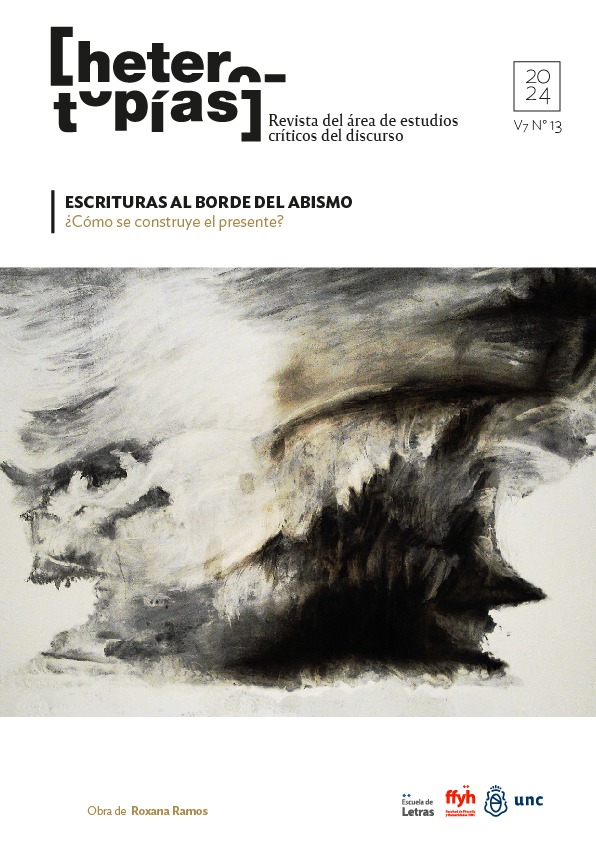Six tragic portraits to decipher the enigmatic relationship between childhood and the production of statehood. Dialogue rehearsal with the play “Julius Caesar” by William Shakespeare
Main Article Content
Abstract
This article aims to reflect on the relationship between Childhood, State, and Society in contemporary Latin America. To do this, we take Shakespeare's tragic work "Julius Caesar," written in the 14th century, and construct portraits from dialogues between this literary work and from the field of childhood and feminism. These portraits, which are intrinsically related, intend to dismantle problematic knots around the production of childhood. We understand that the signing of the Convention on the Rights of the Child represents an important moment that tensions historical discourses and interventions in this field. From this point, we invite you to explore the reading of the six portraits as a correlate that allows identifying and elaborating reflections on childhood as a historical production situated in different disputes for hegemony. To conclude, we list some reflections in order to open debates and continue studying childhood from a critical reading based on the literary work of William Shakespeare as a contribution to rethinking the social.
Downloads
Article Details

This work is licensed under a Creative Commons Attribution-NonCommercial-ShareAlike 4.0 International License.
Those authors who have publications with this journal, accept the following terms: Those authors who have publications with this journal, accept the following terms:
a. The authors will keep their copyright and guarantee to the journal the right of first publication of their work, which will be simultaneously subject to the Creative Commons Attribution - Non-Commercial - Share Alike (by-nc-sa) Attribution License; no commercial use of the original work or any derivative works is allowed, the distribution of which must be done with a license equal to the one that regulates the original work.
b. Authors may adopt other non-exclusive license agreements for the distribution of the published version of the work (e.g., deposit it in an institutional telematic archive or publish it in a monographic volume) provided that the initial publication in this journal is indicated.
c. Authors are allowed and recommended to disseminate their work through the Internet (e.g. in institutional telematic archives or on their website) before and during the submission process, which may lead to interesting exchanges and increase the number of citations of the published work. (See The effect of open access).
How to Cite
References
Ariés, P. (1988). El descubrimiento de la infancia. El niño y la vida familiar en el antiguo régimen. Taurus. Madrid.
Carli, S.M.E. (abril, 2010); Notas para pensar la infancia en la Argentina (1983-2001):
Figuras de la historia reciente. Educacao em Revista; 26; 1; 4-2010; 351-381. Universidade Federal de Minas Gerais. Faculdade de Educação. Brazil. Recuperado de https://ri.conicet.gov.ar/handle/11336/188237
Gené, M.; Heredia, M. & Perelmiter, L. (2021). El carácter múltiple de la racionalidad estatal: ministerios, funcionarios y desafíos de gobierno en la Argentina. Sociohistórica, 48, e139, septiembre-febrero. Recuperado de: http://www.scielo.org.ar/scielo.php?pid=S1852-16062021000200139&script=sci_abstract
Llobet, V. (2015). La infancia y su gobierno: una aproximación desde las trayectorias investigativas de argentina. Política & trabalho Revista de Ciências Sociais, n.º 43, Julho/Dezembro de 2015, p. 37-48. Brazil. Recuperado de https://notablesdelaciencia.conicet.gov.ar/bitstream/handle/11336/71056CONICET_Digital_Nro.dda4f96d-bc05-47a3-9a10-7db0bba69330_A.pdf?sequence=2&isAllowed=y
Llobet, V. & Medan, M. (junio, 2015). Políticas sociales y violencias hacia las y los niños y jóvenes en Argentina. Controversias y Concurrencias Latinoamericanas; 7; 11; 7-2015; 127-140. Asociación Latinoamericana de Sociología. Recuperado de https://ri.conicet.gov.ar/handle/11336/56528
Llobet, V. (2020). Las regulaciones del cuidado y los derechos de niños y niñas. Un debate situado. Améfrica Ladina XXXVIII LASA.
Merklen, D. (2005). Pobres ciudadanos. Gorla. Buenos Aires. Pérez Alvarez, J. (2022). La producción de estatalidad en el campo de intervención de la infancia pobre: reflexiones a partir de una investigación empírica en barrios populares. En: Villalta, C. & Martínez, M.J. (2022) Estado, infancias y familias. Estudio de Antropología Política y Jurídica. CELS, FFyL UBA. CABA.
Recuperado de: https://www.teseopress.com/estadoinfanciasyfamilias/chapter/la-produccion-de-estatalidad-en-el-campo-de-la/
Rinesi, E. (2021). ¡Qué cosa, la cosa pública! Ubu. Buenos Aires.
Shabel, P. (septiembre, 2019). Todo es política (de infancia). Observatorio Participativo de Políticas Públicas en Educación (OPPPEd)- FFyL UBA. Buenos Aires. Recuperado de http://www.iice.institutos.filo.uba.ar/sites/iice.institutos.filo.uba.ar/files/Shabel.pdf
Shakespeare, W. (2014). Julio César. Versión de Alejandra Rojas. Tragedias. Obra Completa. Traducción de: Andreu Jaume et all. Debolsillo. Barcelona.
Tzeiman, A. (2021). La fobia al Estado en América Latina: Reflexiones teórico-políticas sobre el desarrollo y la dependencia. Instituto de Investigaciones Gino Germani. FCS UBA. Buenos Aires.
Recuperado de https://iigg.sociales.uba.ar/wp-content/uploads/sites/22/2021/04/La-fobia-al-Estado.pdf
Villalta, C. (mayo-octubre, 2021). Antropología de las intervenciones estatales sobre la infancia, la adolescencia y la familia. Cuadernos De antropología Social, (53), 21-37. Recuperado de https://doi.org/10.34096/cas.i53.10169
Graziano, F., & Grinberg, J. (mayo-octubre, 2021). La administración de la infancia y la adolescencia hoy. Cuadernos De antropología Social, (53), 7-19. Recuperado de: https://doi.org/10.34096/cas.i53.10177
Zibbechi, C. (enero-junio, 2022). ¿Nuevas formas de sociabilidad y politicidad en torno a los cuidados? Los movimientos sociales desde la perspectiva de los cuidados. La ventana vol.6 no.55 371-388. https://doi.org/10.32870/lv.v6i55.7410
